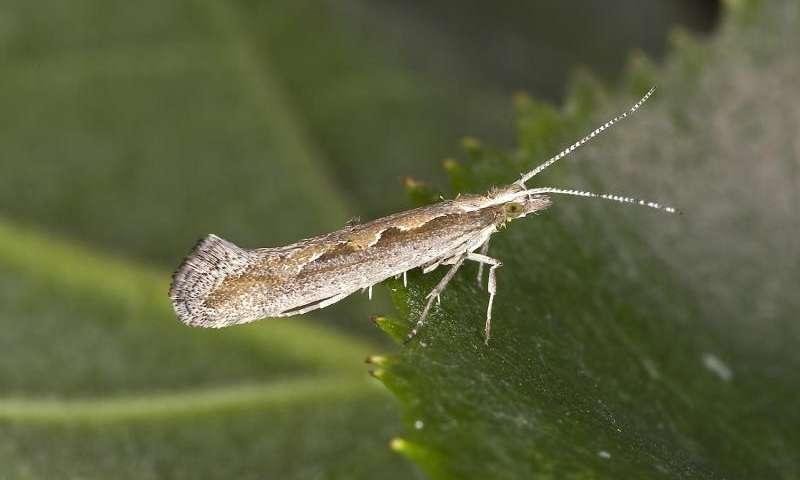A diamondback moth prepared to destroy some crops. Photo by Olei/Wikipedia/CC
OXFORD, England, July 16 (UPI) -- Researchers with British company Oxitec say their genetically modified moths have been proven safe and effective in a controlled greenhouse setting, and that they're now ready for the big time.
The scientists detailed their moths' recent laboratory successes in a paper published this week in the journal BMC Biology. Now, they're preparing to take their creation to the fields.
Their creation is a male moth capable of passing on genetic flaws that render future generations unable to reproduce. Released in mass, these moths will mate with local populations and help diminish reproduction rates -- at least in theory anyways.
Researchers elsewhere are preparing to use similar techniques in Africa and South America to reduce mosquito populations.
Diamondback moth caterpillars are one of the agriculture's most destructive pests, annually causing billions of dollar of damage to kale, cabbage, canola, broccoli and cauliflower crops. Right now, caterpillars are winning the arms race of pest control.
The moths have adapted resistance to most pesticides, forcing farmers to use new concoctions of chemicals -- and in greater quantities. The result is both expensive and bad for the environment.
Researchers hope their new designer moths can absolve this ongoing problem. And they believe their technology can be applied in the curbing of other menacing pests.
"This research is opening new doors for the future of farming with pest control methods that are non-toxic and pesticide-free," study author Neil Morrison, lead research scientist on Oxitec's diamondback moth program, told the BBC. "We all share an interest in safe and environmentally friendly pest control, so this is a very promising tool that could be put to good use by farmers."
Naturally, some scientists are skeptical. Helen Wallace from GeneWatch, who is critical of genetically modified technologies, says the ultimate intervention happens too late in the moth's lifecycle.
"The female offspring of the GM moths mainly die as larvae when they are feeding on the crop," she said. "This means the crop will already be damaged by the time the adult numbers are reduced and it will also be contaminated by large numbers of dead GM larvae."
"We don't know if this is going to be safe for humans or wildlife," Wallace added, "because the necessary tests have not been done, but it is unlikely to be popular with farmers or consumers."















